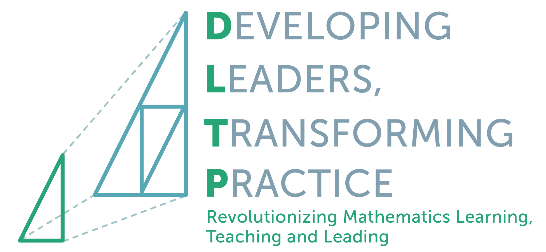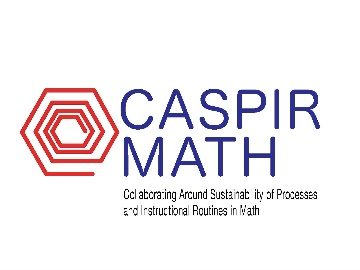 Administrators and teacher leaders are playing a critical role in improving preK-12 STEM education by providing updated technology, materials, and equipment; offering professional development opportunities; and establishing policies and procedures that support teachers, students, and families in their efforts to engage with STEM learning. In this Spotlight, learn more about how two DRK-12 projects are engaging administrators and teacher leaders to create a culture of STEM learning, ensure high-quality instruction, and inspire students to pursue STEM-related fields.
Administrators and teacher leaders are playing a critical role in improving preK-12 STEM education by providing updated technology, materials, and equipment; offering professional development opportunities; and establishing policies and procedures that support teachers, students, and families in their efforts to engage with STEM learning. In this Spotlight, learn more about how two DRK-12 projects are engaging administrators and teacher leaders to create a culture of STEM learning, ensure high-quality instruction, and inspire students to pursue STEM-related fields.
In this Spotlight...
- Featured Projects
- Related Resources
Featured Projects
Collaborating Around Structures, Processes, and Instructional Routines (CASPIR) in Mathematics (CASPIR Math Project)
PI: Alison Castro Superfine
Grade Level(s): K-8
STEM Discipline(s): Mathematics
Project description: The focus of the CASPIR Math Project is to develop and implement the Elementary Mathematics Leadership (EML) model for K-8 math, a multi-component professional development PD intervention that spans across three levels (teacher, school and district). The EML model is particularly designed to improve teachers’, teacher leaders’, and administrators’ understandings of effective math teaching and learning in ways that are aligned with the Common Core State Standards for Mathematics (CCSSM). In addition, the EML model is designed to enhance the organizational capacities of schools and districts to support and sustain such improvements in math teaching and learning. The EML model uses a Design-Based Implementation Research (DBIR) process involving collaboration between researchers, professional developers, and district and school personnel to co-develop the professional development from district- through teacher-levels. The components of the EML model include: (1) gathering information about problems of practice collaboratively identified by districts, schools, and the research team as most critical to math instructional improvement efforts in relation to the CCSSM, and developing goals related to these identified problems; (2) designing and implementing coherent professional development that is aligned with identified problems of practice for district administrators, school administrators and teacher leaders, and teachers; and (3) engaging in two iterative cycles of development, implementation, and revision to productively adapt the EML model to changing district contexts and conditions.
What is the role of administrators and/or teacher leaders in your research? How and why are you engaging administrators and/or teacher leaders to improve STEM education? What advice do you have that is particular to working with administrators or teacher leaders?: The collaboration between researchers, professional developers, and district and school personnel largely occurs through the development and implementation of district math leadership teams (DMLTs). In the beginning of the project, a DMLT is formed in each district with teachers, district/school administrators, and the research team. DMLTs regularly meet and collaborate with the research team to co-develop a robust vision for math teaching and learning at the district level. Once the vision is articulated, the DMLT uses data to assess the district’s strengths and needs in light of the vision. Math goals and strategies are then articulated to support math improvement in relation to local problems of practice and a set of “big ideas” linked with math standards.
Professional development is then co-designed and co-implemented by the DMLTs, and aimed at teachers, school leaders, and district leaders. This professional development attends to a range of issues, depending on the vision for math teaching and learning and on the specific local problem of practice on which the DMLTs decide to focus. For example, professional development could focus on developing school organizational capacities for supporting instructional improvement through within school collaboration, including the formation of horizontal (grade-level) and vertical (multi-grade) teacher teams, coach and peer classroom observations/discussion, and school-walk-throughs that bring together teachers and administrators to support learning and instructional improvement in line with the district vision. Finally, as noted above, DMLTs engage in iterative cycles of design and redesign annually. CASPIR is grounded in a continuous “cycle of inquiry” approach as part of DBIR, in which problems are identified, data is collected, goals are set, strategies are implemented, strategies are assessed, and the cycle begins anew.
Our work in CASPIR holds many lessons for working with teachers and administrators. First, developing trust and a rapport among teachers, administrators, and members of the research team is crucial. Improvement work at school and classroom levels cannot proceed effectively without trust. Second, having members of the research team who can serve as “boundary spanners”—people who can effectively connect practitioners and researchers—can be a useful foundational element for developing trust and ensuring that the work is relevant to teachers’ and administrators’ local problems of practice. In CASPIR’s case, professional developers with strong, pre-existing relationships with the participating districts served in this role. Finally, in CASPIR we leverage design principles from research-practice partnerships, particularly the notion that such partnerships are intentionally organized to shift power relations and generally use strategies to ensure that all collaborators have a say in the work. Ensuring that teachers and administrators are truly collaborators and co-developers of improvement strategies rather than passive recipients is crucial for local ownership and applicability of these strategies.
Product(s):
- Presentations
- Akgul, E. & Castro Superfine, A. (2023). Analyzing teacher earning in a research practice partnership. Paper presented at the International Society of the Learning Sciences Annual Conference, Montreal, Canada.
- Castro Superfine, A. & Superfine, B. (2023). Measuring the impact of research-practice partnerships: Lessons from the CASPIR Math project. Paper presented at the International Society of the Learning Sciences Annual Conference, Montreal, Canada.
- Castro Superfine, A., Superfine, B. M., De Voto, C., Dewit, M., Han, A., Akgul, E., & Yin, Y. (2023, April). Results from research-practice partnership focused on organizational and individual capacity-building to improve mathematic instruction. Paper presented at the American Educational Research Association Annual Conference, Chicago, IL.
- De Voto, C. & Superfine, B. M. (2023, April). The crisis you can’t plan for: K-12 leader responses and organizational preparedness during COVID-19. Paper presented at the American Educational Research Association Annual Conference, Chicago, IL.
- De Voto, C. & Superfine, B. M. (2022, November). The crisis you can’t plan for: K-12 leader responses and organizational preparedness during COVID-19. Paper presented at the University Council for Educational Administration Annual Conference, Seattle, WA.
- Siciliano, L. & Akgul, E. S. (2022, November). Exploring administrators’ visions of equitable math instruction. Paper presented at the North American chapter of the Psychology of Mathematics Education Annual Conference, Nashville, TN.
- Superfine, B. M., Castro Superfine, A., De Voto, C., & Han, A. (2022, June). How research-practice partnerships learn to develop goals for math and identify local problems of practice. Paper presented at the International Conference of the Learning Sciences Annual Conference, Hiroshima, Japan.
- De Voto, C., Superfine, B. M., & DeWitt, M. (2022, April). How are district and school administrators responding to COVID-19? Paper presented at the American Educational Research Association Annual Conference, San Diego, CA.
- Publications
- De Voto, C. & Superfine, B. M. (in press). The crisis you can’t plan for: K-12 leader responses and organisational preparedness during COVID-19 (special issue). School Leadership & Management.
- De Voto, C., Pitvorec, K., & Castro Superfine, A. (in press). Building a scalable model for effective networked improvement across schools: The case of district math leadership teams. In J. Eckert & B. Carpenter (Eds.), Catalytic improvement communities. Information Age.
- De Voto, C., Superfine, B. M., & DeWitt, M. (in press). Navigating policy and local context in times of crisis: District and school administrator responses to the COVID-19 pandemic. Educational Administration Quarterly.
- Superfine, B. M., Castro Superfine, A., De Voto, C., & Han, A. (in press). How research-practice partnerships learn to develop goals for math and identify local problems of practice. In E. Reynolds & S. Hayes (Eds.), Continuous improvement: A leadership process for school improvement. Information Age.
- Superfine, B. M., De Voto, C., Siciliano, M., & Castro Superfine, A. (under review). Research-practice partnerships and network effectiveness. American Educational Research Journal.
Developing Leaders, Transforming Practice in K-5 Mathematics: An Examination of Models for Elementary Mathematics Specialists
 PI: Nicole Rigelman
PI: Nicole Rigelman
Grade Level(s): K-5
STEM Discipline(s): Mathematics
Project Description: The Developing Leaders, Transforming Practice (DLTP) is a partnership between Portland Public Schools (PPS), Portland State University (PSU), and RMC Research Corporation (RMC). DLTP is a K-5 mathematics intervention focused on demonstrating the effectiveness of the DLTP professional development (PD) model in terms of improving teachers’ instructional practices (Goal 1), increasing student mathematics understanding and achievement (Goal 2), and evaluating the efficacy and use of Elementary Mathematics Specialists (EMSs) by testing four implementation models that take into account the various ways EMSs are integrated into schools (Goal 3).
What is the role of administrators and/or teacher leaders in your research? How and why are you engaging administrators and/or teacher leaders to improve STEM education? What advice do you have that is particular to working with administrators or teacher leaders?: Teacher leaders and coaches are the main participants in our research. As one aspect of our professional learning (PL), we are providing Mathematics Instructional Leader (MIL) coursework that culminates with a specialization on an Oregon Teaching License. In addition, teacher participants engage in one book study per year and three project wide events that include their building administrator.
Administrators participate in three administrator-specific PL sessions, designed to provide them with experiences connected to the content explored by their teacher leaders and coaches. Topics include various aspects of the equitable and effective teaching practices (NCTM, 2020) and the intersection with the district’s mathematics curriculum materials, adopted in year 2 of the project. Administrators also participate in the project wide events and spend a portion of that time planning for mathematics- focused professional learning in their building.
The design of the administrator PL, while informed by the work with teacher leaders and coaches, is qualitatively different because of their unique role in leading efforts toward a vision of mathematics teaching and learning. The sessions included topics such as providing feedback to teachers following a classroom observation, planning a yearlong math-focused PL calendar, and strategizing ways to employ mathematics teacher leaders and coaches in service of the school’s goals.
Initial Findings: To date, the only information we’ve gathered from administrators is formative feedback from the professional learning (i.e., administrator PL and project wide events) used to provide between session support and plan future PL. In the final year of the project, we intend to conduct interviews with the building administrators.
Product(s): Website
Related Resources
